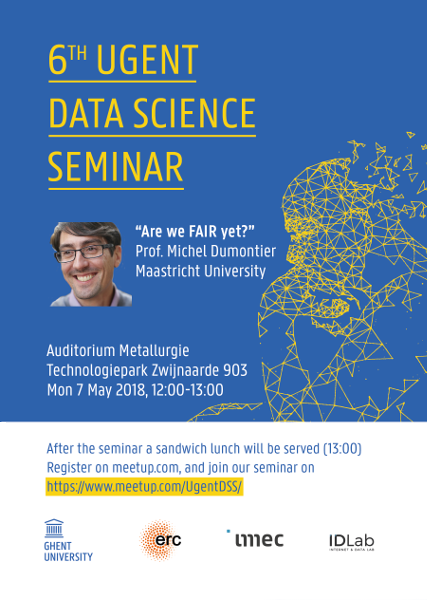6th UGent Data Science Seminar with Prof. Michel Dumontier

Prof. Michel Dumontier (Maastricht University): Are we FAIR yet?
Abstract
The FAIR Principles propose key characteristics that all digital resources (e.g. datasets, repositories, web services) should possess to be Findable, Accessible, Interoperable, and Reusable by people and machines. The Principles act as a guide that researchers should expect from contemporary digital resources, and in turn, the requirements on them when publishing their own scholarly products. As interest in, and support for the Principles has spread, the diversity of interpretations has also broadened, with some resources claiming to already “be FAIR”. This talk will elaborate on what FAIR is, why we need it, what it entails, and how we should evaluate FAIRness. I will describe new social and technological infrastructure to support the creation and evaluation of FAIR resources, and how FAIR fits into institutional, national and international efforts. Finally, I will discuss the merits of the FAIR principles (and what we ask of people) in the context of strengthening data-driven scientific inquiry.
Bio
Dr. Michel Dumontier is a Distinguished Professor of Data Science at Maastricht University. His research focuses on the development of computational methods for scalable integration and reproducible analysis of FAIR (Findable, Accessible, Interoperable and Reusable) data. His group combines semantic web technologies with effective indexing, machine learning and network analysis for drug discovery and personalized medicine. Previously at Stanford University, Dr. Dumontier now leads a new inter-faculty Institute for Data Science at Maastricht University with a focus on accelerating scientific discovery, improving health and well-being, and strengthening communities. He is a Principal Investigator for the NCATS Biomedical Data Translator, a co-Investigator for the NIH Data Commons, and a co-Investigator for the NIH BD2K Center for Expanded Data Annotation and Retrieval (CEDAR). He is a founding member of the FAIR (Findable, Accessible, Interoperable, Re-usable) initiative, a member of the Dutch Techcenter for Life Sciences, and is the scientific director for Bio2RDF, an open source project to generate Linked Data for the Life Sciences. He is the editor-in-chief for the IOS press journal Data Science and an associate editor for the IOS press journal Semantic Web.
After the seminar, a sandwich lunch will be provided for registered participants.
